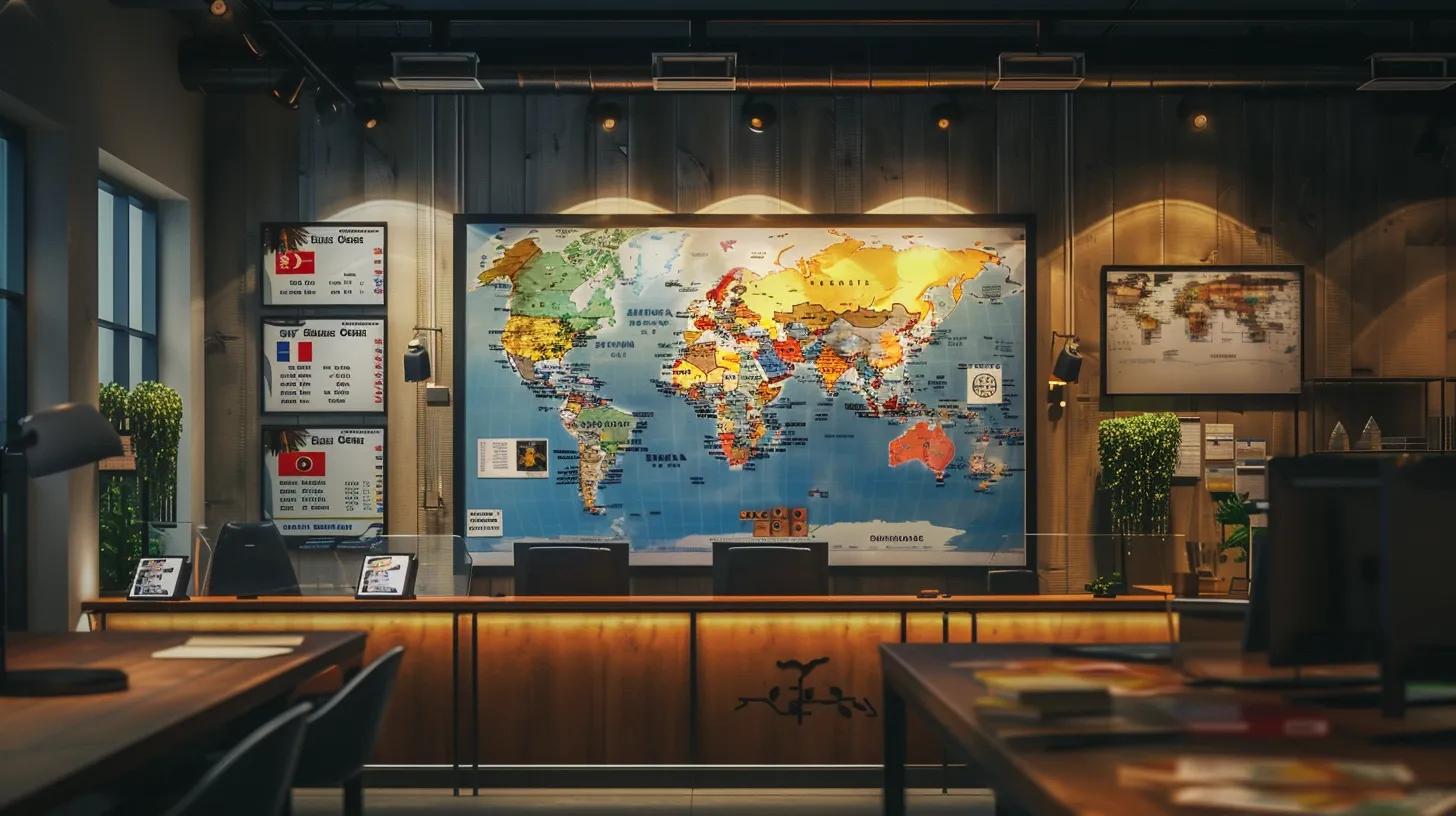
Table Of Contents:
- Key Takeaways
- What Are the Best Visa Strategies for Successful Country Hopping?
- How Can Personalized Visa Consultations Improve Your Country Hopping Experience?
- What Are the Tax and Legal Considerations When Country Hopping?
- How to Manage Lifestyle and Relocation Challenges During Country Hopping?
- What Ongoing Support Is Essential for Long-Term Country Hopping Success?
- Which Countries Offer the Most Flexible Visa Options for Country Hoppers?
- How to Plan Your Country Hopping Journey for Maximum Visa Efficiency?
- Table: Comparative Overview of Visa Options
- Final Thoughts
- Frequently Asked Questions
Visa strategies can be the difference between an enriching international experience and endless bureaucratic hurdles. In today’s mobile world, more individuals are choosing country hopping as a lifestyle, whether to work remotely, explore new cultures, or simply live as perpetual travelers. However, the complexity of visa requirements and the constant evolution of international travel rules demand that you not only understand the available visa options but also adopt smart strategies to streamline the process. This article is designed to equip you with the advanced strategies that successful voyagers use to navigate visa regulations, align travel plans with application deadlines, and avoid common pitfalls.
In this guide, you will learn about the visa types that support flexible travel across borders, how to tailor your visa choices to your travel goals, and the frequent mistakes that can derail your journey. Furthermore, you will discover how personalized consultations can save time and prevent future issues, as well as explore the tax, legal, and lifestyle challenges that arise when you decide to move across multiple countries. Recognizing that every traveler faces a unique set of circumstances, our comprehensive approach combines practical advice with actionable insights, ensuring that whether you hold an Australian passport or belong to a digital nomad collective, you have the tools to make informed decisions.
We begin by examining the core strategies for effective visa management in the context of country hopping. You’ll then be guided on how to leverage expert consultations and ongoing support systems to stay ahead of changing regulations. Finally, we discuss the tax and legal considerations, practical tips on managing relocation challenges, and the emerging visa trends that are reshaping the landscape for global travelers. By the end of this article, you will have a clear vision of how to craft a seamless country hopping journey with maximum visa efficiency, all the while minimizing stress and maximizing opportunities for adventure.
Key Takeaways
- Smart visa strategies ensure a seamless transition across borders by aligning travel plans with evolving visa requirements.
- Personalized consultations help prevent future issues by providing tailored recommendations and up-to-date regulation insights.
- Tax, legal, and lifestyle challenges are manageable with proper planning and ongoing support.
- Awareness of emerging visa trends and flexible issuing countries empowers you to optimize your travel itinerary.
- A dedicated support team and continuous monitoring are essential for long-term country hopping success.
What Are the Best Visa Strategies for Successful Country Hopping?

To successfully hop from one country to another, the best visa strategies revolve around flexibility, real-time monitoring, and proactive planning. You must know which visa types allow repeated entries and long stays, so that your travel is not interrupted by sudden rule changes or bureaucratic delays. Countries with flexible visa regimes often support continuous travel with minimal paperwork, making them perfect for digital nomads and perpetual travelers. It is essential to align your visa strategy with your travel schedule, ensuring that you have the necessary permits for both short visits and longer stays.
Which Visa Types Support Flexible Country Hopping?
The visa types that support flexible country hopping include multiple-entry visas and long-term tourist visas. Multiple-entry Schengen visas, for instance, allow travelers to enter and exit the Schengen area repeatedly within a defined period. Some countries also offer digital nomad visas, which are designed specifically for remote workers, allowing a stay for up to a year or more. Additionally, visa waiver programs enable citizens from qualifying nations to travel without a visa for short durations, but it is important to understand the limitations and requirements that come with them. The key is to target visa categories that provide leeway in days and permit unlimited entries, ensuring that your itineraries are not hampered by strict entry and exit rules.
How to Choose the Right Visa Based on Your Travel Goals?
Choosing the right visa starts with a clear understanding of your travel objectives. If your goal is to explore a region extensively, a long-term tourist or remote worker visa might be best. For those who plan frequent crossings, a multiple-entry visa offers the flexibility to jump between countries with ease. The decision hinges on factors such as duration of stay, the frequency of travel, and even the nature of purpose—whether tourism, education, or business. By analyzing these parameters, you can avoid a one-size-fits-all approach and instead select visa options that match your itinerary and lifestyle. Many experienced travelers use a combination of visa types to optimize their travel; for example, pairing a multiple-entry visa with a digital nomad visa allows them to work remotely while enjoying extended stays in various locations.
What Are Common Visa Pitfalls to Avoid When Country Hopping?
Common pitfalls include underestimating processing times, overlooking necessary documentation, and failing to verify visa validity across neighboring countries. A frequent error is misjudging entry requirements, such as not leaving sufficient time between visa expiration and travel dates. Other pitfalls include not accounting for tax or legal implications in multi-country stays. Over-reliance on visa waiver programs without backup plans can also cause problems, especially if border control policies change unexpectedly. Avoiding these pitfalls requires diligent research, consultation with visa experts, and regular monitoring of policy updates. Ultimately, thorough preparation and awareness of potential errors protect you from unexpected delays or even entry denial.
How Can Personalized Visa Consultations Improve Your Country Hopping Experience?
Personalized visa consultations provide tailored advice that can significantly enhance your travel experience. Rather than applying general visa tips, a one-on-one consultation offers an in-depth analysis of your personal travel situation. Experts help you understand subtle regulatory nuances, optimize application timing, and compile the most accurate documentation for your unique profile. They also update you on any upcoming policy changes that could impact your travel plans, ensuring that you can adjust your itineraries proactively.
What Does a Visa Strategy Consultation Include?
A visa strategy consultation typically includes a comprehensive review of your travel history, current and future travel plans, and an assessment of your eligibility for various visa types. During this process, visa consultants analyze your passport details, destination requirements, and any past visa rejections to build a customized strategy. They provide a detailed checklist of the necessary documents, advise on the ideal timing for applications, and offer insights into specific regional policies. The consultation also covers risk management strategies to avoid common pitfalls and outlines contingency plans to address possible delays or complications in your visa process.
How Does Tailored Visa Planning Prevent Future Issues?
Tailored visa planning prevents future issues by anticipating regulatory changes and aligning your travel itinerary with the most suitable visa options. By analyzing trends and upcoming policy changes, experts can offer recommendations that mitigate risks such as unexpected visa denials or lapses in eligibility. Personalized planning includes clear timelines, document preparation, and backup plans, ensuring that each trip is fully compliant with current international travel laws. This strategic approach not only saves time but also minimizes financial and emotional stress associated with last-minute visa snafus.
When Should You Seek Expert Visa Application Support?
You should consider expert visa application support whenever you plan a complex itinerary, especially one involving multiple countries with differing visa regimes. If you are uncertain about the documentation required, have experienced previous visa denials, or plan to travel during periods of regulatory change, expert support is invaluable. Additionally, when you are launching a lifestyle as a digital nomad or planning long-term relocation, personalized advice can help streamline the process and ensure that you meet all legal requirements seamlessly. Early consultation also allows ample time to address any issues that might arise before you start your journey.
What Are the Tax and Legal Considerations When Country Hopping?

Tax and legal considerations are critical components of country hopping, significantly impacting your financial stability and legal compliance. Different countries impose varying tax obligations on residents, and these can change based on how long you stay or the nature of your income. Understanding these differences is essential to avoid legal pitfalls that could lead to penalties, double taxation, or worse. Equally, being aware of legal requirements such as visa conditions, local labor laws, and healthcare entitlements ensures that your travel remains trouble-free and that you fulfill all responsibilities as a temporary resident.
How Do Tax Obligations Change Across Different Countries?
Tax obligations can vary greatly depending on your residency status, the source of your income, and the local regulations of each country you visit. For example, many European Union countries implement strict tax residency rules that depend on days spent in the country, which can result in unexpected tax liabilities if thresholds are exceeded. Meanwhile, some nations offer tax incentives for digital nomads and expats, reducing your taxable income significantly. A professional consultant can help you navigate these nuances, advising on bilateral tax treaties and ensuring you file the appropriate documentation in each jurisdiction, thereby preventing double taxation and ensuring compliance.
Which Legal Requirements Should You Know Before Moving?
Before moving to a new country, it is crucial to understand the legal requirements that might affect your stay. These include registration mandates, work permit provisions, and residency requirements. Some countries require expats to register with local authorities within a specific timeframe, while others demand evidence of sufficient funds or health insurance. In addition, legal aspects such as driving licenses, rental agreements, and even local contract laws can affect your daily life. By familiarizing yourself with these requirements beforehand, you can avoid legal entanglements and ensure a smoother transition into your new domicile.
How Can Professional Referrals Help With Tax and Legal Compliance?
Professional referrals act as a crucial bridge between you and the complex world of international taxation and legal requirements. Expert referrals can link you with reputable tax advisors, immigration lawyers, and local legal experts who stay updated on regional laws. This network not only provides targeted advice but also helps you resolve issues faster if complications arise. For example, a tax advisor familiar with both your home country and your destination country can ensure compliance with bilateral agreements, while a local attorney can assist with registration or lease agreements. Access to this specialized expertise guarantees that you remain compliant and avoid costly legal mistakes while country hopping.
How to Manage Lifestyle and Relocation Challenges During Country Hopping?
Managing lifestyle and relocation challenges during country hopping requires strategic planning and a proactive mindset. When you move from one country to another, adjusting to new cultures, healthcare systems, and educational pathways is inevitable. The process can be overwhelming if approached haphazardly, but proper planning can turn relocation challenges into opportunities for personal growth. Understanding local customs, securing temporary housing, and ensuring access to essential services such as healthcare and quality education are crucial for a smooth transition. This section explores the key strategies and resources that can support you in managing these challenges while maintaining a flexible lifestyle.
What Are Key Factors in Finding Accommodation Abroad?
Finding suitable accommodation is often one of the biggest hurdles for country hoppers. Key factors include affordability, proximity to essential services, and the availability of short-term leases or furnished rentals. You should also consider the flexibility of rental agreements, which allow you to extend or shorten your stay without penalties. Utilizing local real estate agents, online platforms, and expat community recommendations can give you access to hidden gems that are not listed publicly. In many cases, negotiating with landlords for a trial period may be beneficial if you are unsure about long-term plans. Additionally, having a temporary housing backup plan can prevent disruptions if your initial choice falls through.
How to Access Healthcare and Education While Moving Countries?
Accessing reliable healthcare and quality education is critical when relocating to a new country. Many countries offer public healthcare systems, but these may require proof of residency or enrollment in local programs. Alternatively, private health insurance tailored for expatriates can ensure that you receive high-quality care without interruptions. For families, researching international schools or local education systems early on is essential, as admission processes and curricula vary greatly. Online resources, expat networks, and local government agencies can help you navigate these systems, ensuring that you have all the necessary documentation and meet all criteria for healthcare and education services.
What Resources Support Smooth Relocation Transitions?
Several resources can ease the challenges of relocation, including relocation consultants, expat community groups, and digital platforms that centralize information on housing, healthcare, and legal compliance. Relocation consultants offer end-to-end services that cover everything from visa applications to finding schools and setting up bank accounts. Expat forums and social media groups provide firsthand advice and local insights that are invaluable when adjusting to a new culture. Additionally, digital platforms with comprehensive checklists, video guides, and local government resources can streamline the administrative processes that often cause delays and frustration. By leveraging these resources, you can minimize the stress of relocation and focus on enjoying your new surroundings.
What Ongoing Support Is Essential for Long-Term Country Hopping Success?

Long-term country hopping success depends not only on initial planning but also on continuous support throughout your travels. Ongoing support ensures that you remain compliant with ever-changing visa regulations and can quickly adapt to new administrative challenges. A dedicated support system, including digital tools for visa management and access to consultants, will minimize bureaucratic delays and help you maintain uninterrupted travel. Furthermore, continuous support provides peace of mind, knowing that expert guidance is readily available if unforeseen challenges or changes occur. This ongoing network allows you to focus on your adventures while handling practical logistics in the background.
How Does Continuous Visa Monitoring Prevent Issues?
Continuous visa monitoring involves staying up-to-date with regulatory changes, renewals, and expiration dates, thereby preventing unexpected legal issues or lapses in travel authorization. Many visa management platforms now offer automated alerts and upcoming deadline notifications, ensuring you are always prepared well in advance of renewal dates or policy changes. This proactive approach minimizes the risk of overstaying a visa or encountering sudden changes in border control policies. Moreover, regular consultation with visa experts helps you adapt your travel plans to any evolving scenarios, ensuring continuous compliance regardless of geopolitical shifts or changes in international travel law.
What Role Does a Dedicated Support Team Play?
A dedicated support team is essential for long-term country hopping success as they provide real-time assistance with visa applications, renewals, and regulatory updates. This team typically includes visa consultants, legal advisors, and tax professionals who work together to ensure that your travel remains seamless and legally compliant. They offer personalized advice, help resolve complex issues, and maintain a monitoring system that alerts you to any changes affecting your status. With a support team, you benefit from expert intervention at critical times, reducing downtime and ensuring that administrative hurdles do not disrupt your travel agenda.
How to Stay Updated on Changing Visa Regulations?
Staying updated on changing visa regulations requires a combination of continuous education, digital monitoring tools, and regular consultations with experts. Subscribe to government newsletters, join expat communities, and follow reputable immigration blogs for real-time updates. Additionally, utilize digital solutions that aggregate and analyze regulatory changes across multiple countries. This multi-faceted approach not only keeps you informed but also lets you adjust your travel plans proactively. By implementing these strategies, you avoid surprises and ensure that your visa status remains valid throughout your country hopping adventures.
Which Countries Offer the Most Flexible Visa Options for Country Hoppers?
Certain countries are renowned for their flexible visa options, making them ideal starting points or hubs for country hoppers. Nations in the European Union, like Portugal and Estonia, offer digital nomad visas with extended stays and the ability to work remotely. Meanwhile, countries such as Thailand and Mexico provide long-term tourist visas and even visa exemption programs for certain nationalities. These destinations not only offer lenient entry requirements but also often support remote work infrastructure, making them popular with digital nomads and perpetual travelers. Understanding which countries prioritize flexibility in their visa offerings can significantly influence your itinerary while reducing administrative burdens.
What Are Top Countries for Digital Nomads and Remote Workers?
Top countries that cater specifically to digital nomads include Portugal, Estonia, Georgia, and Barbados. These nations offer visas designed for remote workers, often allowing extended stays ranging from six months to a year or longer. Portugal’s D7 visa, for example, provides a pathway for long-term residency for self-sufficient individuals. Similarly, Estonia’s digital nomad visa specifically accommodates remote work, reflecting a forward-thinking approach toward global work lifestyles. These destinations not only provide favorable tax and legal conditions but also boast vibrant expat communities, high-speed internet, and a supportive infrastructure for remote work.
How Do Visa Policies Differ Across Popular Regions?
Visa policies can vary significantly across regions based on geopolitical, economic, and cultural factors. In Europe, the Schengen area allows free movement between member states under a common visa regime, while Eastern Europe and the Balkans often have more relaxed entry requirements. In contrast, countries in Asia such as Japan and South Korea maintain strict visa policies with limited long-term options aside from specialized work permits. Latin America generally offers more lenient tourist visas, with some nations even providing temporary residency programs for retirees and remote workers. Understanding these regional differences allows you to strategically plan your route and optimize visa efficiency.
What Are Emerging Visa Trends to Watch?
Emerging visa trends include the growing popularity of digital nomad visas, increased flexibility for remote workers, and the implementation of multi-year tourist visas in select countries. Governments are increasingly recognizing the economic benefits brought by digital nomads and are adjusting their policies to attract this demographic. Additionally, some countries are beginning to integrate biometric data and digital processing into their visa systems, allowing for faster and more secure applications. Observing these trends can help you anticipate future policy changes and select destinations that align with your travel goals.
How to Plan Your Country Hopping Journey for Maximum Visa Efficiency?

Planning is paramount when it comes to maximizing visa efficiency while country hopping. A well-charted plan not only streamlines your visa applications but also synchronizes your travel schedule with application deadlines. This requires careful research to understand the visa processing times, renewal periods, and regional application quirks across your chosen destinations. By aligning your travel itinerary with visa validity periods and using proactive planning tools, you can minimize downtime and avoid the stress of last-minute paperwork. Effective planning involves breaking down your journey into manageable segments, each with its own set of administrative tasks.
What Are Step-by-Step Visa Application Best Practices?
Step-by-step best practices entail beginning with thorough research on destination-specific visa requirements, followed by compiling all necessary documentation early. Next, schedule appointments with the consulates or visa centers well in advance, and consider using professional visa consultants to review your applications. Once submitted, track your application statuses closely and maintain digital copies of all forms and correspondence. A systematic checklist that includes deadlines, required documents, and processing times is indispensable. This methodical approach helps avoid oversights and ensures that you meet each country’s criteria without delay.
How to Align Visa Timing With Travel Itineraries?
Aligning visa timing with travel itineraries involves planning your trips around the expiration dates and processing times of your visas. Begin by mapping out your entire journey, noting the required duration of stays, and the processing time for each visa application. Utilizing a digital calendar specifically for visa deadlines, along with automated reminders from visa management apps, can help you stay on schedule. In some cases, it might be beneficial to apply for visas sequentially with overlapping validity periods to create a buffer against unexpected delays. This level of precision in travel planning ensures a smooth transition between countries without experiencing lapses in legal status.
What Tools and Checklists Help Organize Your Visa Process?
There are several digital tools and checklists available that can simplify the visa process significantly. These include comprehensive visa management platforms that offer document storage, deadline alerts, and status tracking for multiple applications. Additionally, organized spreadsheets and dedicated apps allow you to input each country’s visa requirements, processing times, and expiration dates. Printable checklists, curated by travel experts, help ensure that you do not overlook any key details such as biometric photo requirements, proof of onward travel, and financial documentation. These tools not only streamline the process but also help reduce errors and ensure consistency across your visa applications.
Table: Comparative Overview of Visa Options
Before we move on to the final planning phase, here is a table summarizing the key features of flexible visa options for country hoppers:
This table highlights the diversity of visa options available and showcases how specific visa types align with distinct travel objectives.
Final Thoughts

Navigating the complexities of visa strategies for country hopping is a challenge that can be overcome with careful planning and professional guidance. By understanding the types of visas that offer flexibility and aligning them with your travel goals, you can enjoy uninterrupted travel with minimal bureaucratic stress. Personalized consultations and continuous monitoring further safeguard your journey by anticipating changes and preventing common pitfalls. Embrace a proactive approach to international travel, leveraging digital tools and expert support to create a seamless itinerary that lets you focus on the adventures ahead.
Frequently Asked Questions
Q: How can I ensure my visa strategy remains flexible as I move between countries? A: To ensure flexibility, always opt for visa types like multiple-entry and digital nomad visas that allow repeated travel within a set period. Regularly monitor visa regulation changes using digital tools and consult with experts to adjust plans as needed. This proactive approach helps prevent unexpected delays and lets you modify your itinerary without hassle.
Q: What are the benefits of using professional visa consultations for country hopping? A: Professional visa consultations provide tailored advice by reviewing your travel plans and ensuring all documentation is in order. This service not only saves you time but also anticipates regulatory changes and offers contingency strategies. Such expert support minimizes bureaucratic pitfalls and streamlines the application process, enabling smoother transitions between countries.
Q: How do tax obligations differ for long-term travelers compared to short-term visitors? A: Tax obligations vary significantly; long-term travelers might become tax residents in their host country if they exceed a certain number of days, triggering local tax liabilities. Short-term visitors under visa waiver programs typically face minimal tax implications. Consulting a tax advisor familiar with international tax treaties can help you avoid double taxation and ensure compliance with local laws.
Q: What tools are available to help organize and track my visa requirements? A: Several digital tools and visa management platforms can help track deadlines, store documents, and monitor application statuses. Additionally, customizable spreadsheets and printed checklists specifically designed for visa requirements offer a practical way to manage the process. These resources ensure that you meet all criteria on time and reduce the risk of missing critical deadlines.
Q: Can I change my visa strategy if my travel itinerary or personal circumstances change? A: Yes, visa strategies are flexible and should be adjusted as needed. Regularly consulting with visa experts and staying updated on policy changes allows you to modify your application approach in response to new travel plans or alterations in your financial and personal status. This adaptability is key to maintaining long-term freedom and success in country hopping.



